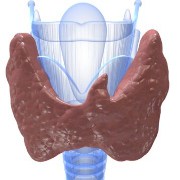 Photo: Getty Images
Photo: Getty Images
Hashimoto's thyroiditis (HT) is also known as Hashimoto's disease or chronic lymphocytic thyroiditis. HT is the most common cause of hypothyroidism. According to the Mayo Clinic, if you have HT, your underactive thyroid gland can take you down an unpleasant path.
Hashimoto's thyroiditis is an autoimmune condition. An antibody that attacks the thyroid gland is produced, which can cause inflammation and hypothyroidism (decreased thyroid function).
Your hair might be dry, your mood irritable and anxious, your concentration poor, and your energy level depleted.
When the thyroid produces an inadequate supply of hormones, it may become enlarged. This is known as goiter. A large goiter can be quite noticeable in your neck and can make breathing and swallowing difficult.
Depression, reduced cognitive capabilities and decreased libido may accompany HT. Hashimoto's thyroiditis may also be linked with heart disease risk. Progression of HT can leave you with an enlarged heart and can even lead to heart failure.
Untreated Hashimoto's thyroiditis can result in myxedema, a rare but potentially lethal condition typified by intolerance of cold temperatures, drowsiness, lethargy and loss of consciousness which can come full-stop at coma. Myxedema can occur from taking sedatives, infection and other stressors. Immediate medical intervention is essential.
Hashimoto's thyroiditis is the most common cause of hypothyroidism in the U.S. Middle-aged women are most likely to get Hashimoto's thyroiditis though HT can affect men, women and children.
Pregnant women with untreated HT may have greater risk of birth defects in their babies. These defects can take the form of abnormalities developmentally and intellectually. Physically, a baby can have a cleft palate and brain, heart or kidney abnormalities.
Your health care practitioner can test levels of hormones from your thyroid and pituitary glands. A blood test looking for abnormal antibodies that are produced in an autoimmune condition can also be taken.
Your doctor will usually treat HT with thyroid hormone replacement. Regularly scheduled follow-up appointments are important to ascertain correct dosages for you, and to monitor whether the dosage needs to change at any point.
In an article published on May 25, 2009, on his website Drweil.com, Dr. Andrew Weil recommended mind/body treatments such as guided imagery therapy and hypnosis. He suggested seeing a Chinese medicine practitioner as well as an endocrinologist.
Weil advocated an anti-inflammatory diet as being helpful for autoimmune conditions. This diet reduces animal protein, increases plant protein and eliminates cows' milk products.
Weil advised avoiding margarine, polyunsaturated vegetable oils and trans-fatty acids, focusing instead on extra-virgin olive oil and omega-3 fatty acids. He recommended using ginger and turmeric supplements.
A Eurekalert! public release from February 25, 2011 reported that new research has suggested that Hashimoto's thyroiditis can increase symptoms, eroding quality of life, even with normal thyroid function. This unfortunate situation is discussed in the peer-reviewed journal Thyroid, the Official Journal of the American Thyroid Association.
Researchers from Kaiserin-Elisabeth-Spital and Medical University of Vienna, Austria indicated that women who had higher amounts of the anti-thyroid antibody also had many more symptoms. This was true despite the fact that their levels of thyroid-stimulating hormone (TSH), which measures thyroid function, were not appreciably different from those of women with lower levels of antibody.
Resources:
Hashimoto's disease
http://www.mayoclinic.com/health/hashimotos-disease/DS00567
Dr. Andrew Weil: Hashimoto's Thyroiditis: An Autoimmune Threat?
http://www.drweil.com/drw/u/QAA400569/Hashimotos-Thyroiditis-An-Autoimmune-Threat.html
Hashimoto's thyroiditis can affect quality of life
http://www.eurekalert.org/pub_releases/2011-02/mali-htc022511.php
Reviewed July 21, 2011
by Michele Blacksberg R.N.
Visit Jody's website and blog at http://www.ncubator.ca and http://ncubator.ca/blogger




Add a Comment1 Comments
I have dealt with Hashimoto's for 26 years, and am one of the unlucky ones that will still suffer symptoms with all my levels in range. It is amazing to see how this disease can affect so many people each in their own way! Unfortunetly it is becoming more common: as my sister, aunt and uncle have now all been diagnosed with it as well.
July 26, 2011 - 7:49pmThis Comment